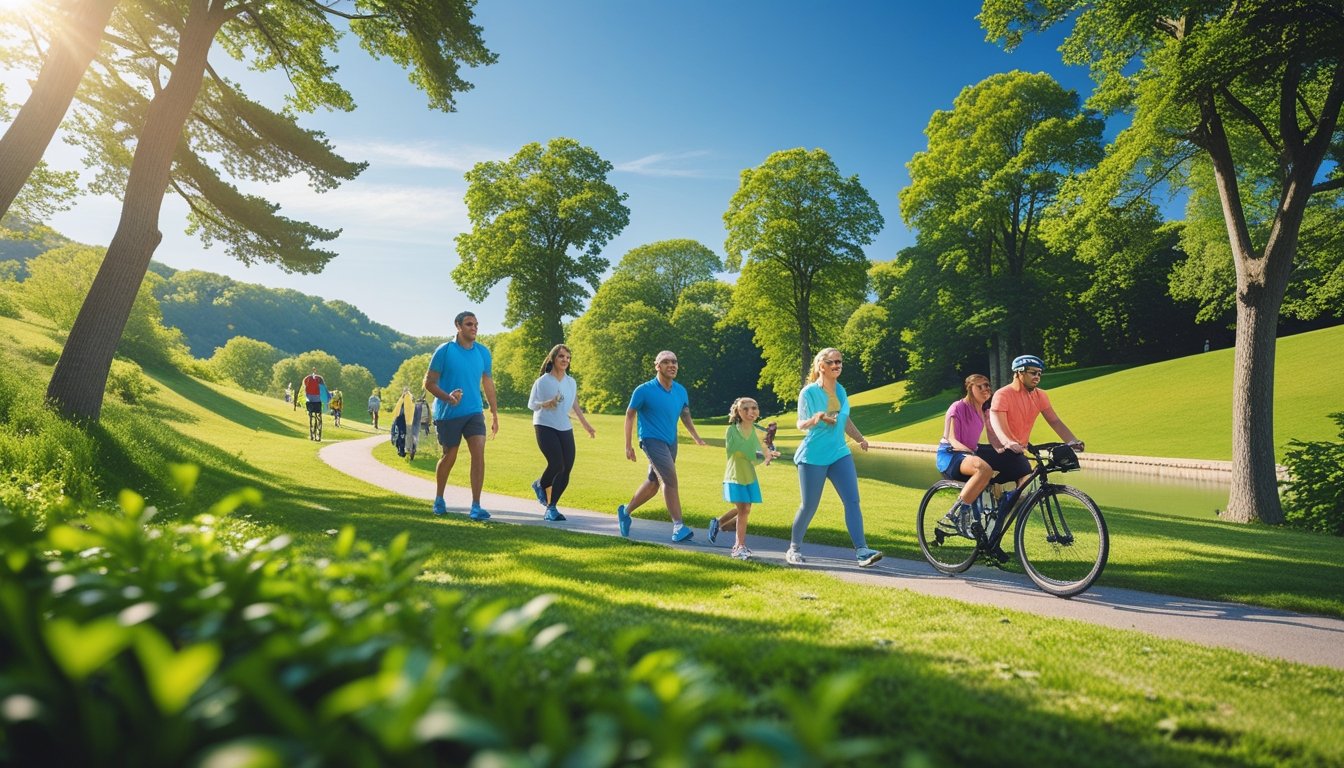Late updated: 23 May 2025 14:05
Written by: Ella Thompson
Exploring the Benefits of Outdoor Activities: Enhancing Well-being and Fitness
Exploring the great outdoors can be the key to unlocking a healthier and more balanced lifestyle. Recent studies underscore the profound impact of outdoor activities on both physical and mental well-being. Spending time in nature significantly enhances mental health while amplifying the benefits of physical exercise, making outdoor activities an indispensable part of a health-conscious lifestyle.

Outdoor activities offer myriad benefits that go well beyond mere exercise. Whether it's a leisurely walk in a park or an exhilarating hike through the hills, being surrounded by nature can reduce stress and elevate mood. In contrast to synthetic environments, natural settings provide a unique opportunity to nurture our mind and body simultaneously.
As we delve into the specifics, we'll explore popular outdoor activities and the unique advantages each offers. From boosting creativity to enhancing social skills, outdoor adventures pave the way for holistic growth. Let’s embark on this journey to discover how outdoor activities can transform our lives and lead us to a healthier tomorrow.
Key Takeaways
- Outdoor activities boost physical and mental health.
- Natural environments enhance exercise benefits.
- Outdoor play promotes creativity and social skills.
Key Health Benefits of Outdoor Activities
Outdoor activities provide a multitude of benefits that enhance various aspects of health. Engaging with nature can lead to significant improvements in physical health, greater mental clarity, and improved bone health through natural vitamin D exposure.
Physical Health Improvements
Participating in outdoor activities encourages a more active lifestyle, which is beneficial for physical health. Regular physical exertion helps maintain a healthy weight, reduces the risk of chronic diseases, and improves cardiovascular health. Outdoor exercises such as hiking, cycling, or even gardening increase endurance, muscle strength, and flexibility. A key advantage is that these activities often do not feel like traditional workouts, making it easier to stay motivated. Moreover, spending time outdoors typically results in more varied movements compared to indoor exercise routines, which can lead to overall functional fitness improvements.
Mental Wellbeing and Attention Span
The mental health benefits of outdoor activities are profound. Being in nature can help reduce symptoms of stress, anxiety, and depression by promoting relaxation and a sense of calm. Several studies have shown how outdoor exercise can improve our overall mood and bolster a positive outlook. Additionally, engaging in nature-related activities enhances our attention span and cognitive function. In our technology-driven world, spending time in nature allows the mind to rest and rejuvenate, fostering sharper focus and creativity. This mental restoration translates to better performance in daily tasks and a more balanced emotional state.
Exposure to Vitamin D and Bone Health
Regular exposure to sunlight while participating in outdoor activities boosts our body's production of vitamin D, which is crucial for bone health. Vitamin D helps our bodies absorb calcium, maintaining strong bones and teeth and preventing conditions like osteoporosis. Many people in modern societies spend a significant portion of the day indoors, which can lead to vitamin D deficiency. Outdoor activities such as walking, jogging, or playing sports serve as a natural way to maintain healthy vitamin D levels. As a result, our bone health is supported, and the risk of fractures and bone-related health issues is reduced.
Popular Outdoor Activities and Their Unique Advantages

Engaging in outdoor activities such as hiking, kayaking, and camping provides physical and mental well-being. These activities offer unique advantages, from boosting cardiovascular health to improving vision.
Hiking and Walking in Nature
Hiking and walking in nature are accessible activities that promote cardiovascular health and mental clarity. These activities can be tailored to different fitness levels, making them suitable for many people. Walking on uneven terrain, such as forest paths, engages muscles differently than walking on flat surfaces. The natural surroundings also reduce stress and encourage mindfulness, making us feel rejuvenated after spending time in nature. We can also experience improved sleep patterns through regular outings in the fresh air.
Kayaking and Water-Based Activities
Kayaking offers a full-body workout while allowing us to explore rivers, lakes, and seas. The paddling action strengthens our core, arms, and shoulders, enhancing endurance and flexibility. Water-based activities provide the additional benefit of being low-impact, which reduces stress on our joints. Beyond the individual physical benefits, kayaking offers a meditative experience, as the rhythmic motion and water's calming effect contribute to mental tranquility. Exploring coastlines or secluded coves can also provide a sense of adventure and discovery.
Camping and Outdoor Play
Camping is an immersive way to engage with the natural world, fostering bonding, creativity, and self-reliance. It allows us to unplug from the digital world and experience nature's simplicity. Setting up tents, cooking over an open fire, and navigating unknown terrains develop problem-solving skills and practical knowledge. Outdoor play, crucial for children, enhances motor skills and encourages imaginative play, developing both physical and cognitive skills. It also inherently instils a love of nature, which can have long-term positive effects on mental health and well-being.
Vision Health and Benefits for Nearsightedness
Spending time outdoors is linked to improved vision health, particularly in reducing the risk of nearsightedness, or myopia, in children. Exposure to natural light is believed to slow the progression of myopia. Outdoor environments encourage our eyes to focus on distant objects, preventing eye strain associated with prolonged near-focus activities like reading or screen time. These benefits underscore the importance of integrating outdoor time into our daily routines, as they promote both eye health and overall well-being.
Frequently Asked Questions

Outdoor activities offer diverse benefits that span physical health, personal growth, and social interactions. They support cardiovascular fitness, mental wellness, and community cohesion, enriching our lives in multiple dimensions.
What are the key advantages of participating in outdoor activities?
Outdoor activities provide physical exercise, mental relaxation, and opportunities for social interaction. They encourage an active lifestyle, improve mood, and facilitate social connections. Additionally, engaging with nature can enhance our overall well-being.
In what ways do outdoor activities contribute to physical health?
Engaging in outdoor activities improves cardiovascular health, boosts vitamin D levels, and promotes better physical fitness. Whether it's hiking, running, or simply walking, being outdoors helps in maintaining a healthy body and enhances general fitness.
How do outdoor activities enhance learning and skill development in children?
Outdoor activities foster advanced motor skills and improve coordination in children. They provide real-world learning experiences and encourage problem-solving. This environment aids in building perseverance and self-discipline, essential traits for personal development and learning.
What role do outdoor activities play in the social well-being of a community?
Participating in outdoor activities strengthens community ties by fostering social interactions. They create a sense of belonging and unity as people engage in shared experiences. Public spaces become communal areas where individuals can connect and contribute to community harmony.
Why are outdoor activities considered important for the personal development of students?
Outdoor activities support the personal development of students by encouraging resilience, fostering independence, and promoting a proactive approach to challenges. They provide a platform for students to explore their interests and build confidence through practical experiences.
Can outdoor play improve mental health, and if so, how?
Outdoor play alleviates stress and enhances mood. Nature immersion can reduce stress hormones and boost creativity, offering a therapeutic effect on mental health. Engaging in physical activity outdoors often results in increased happiness and a more positive mental state.
